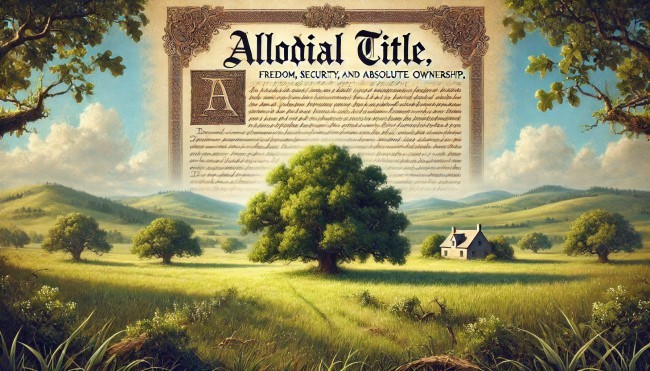Allodial Title: Unlocking the Power of Absolute Land Ownership
Embrace the Freedom and Security of Allodial Title Ownership

The allodial title represents the pinnacle of land ownership, providing absolute control and freedom from any obligations to higher authorities such as landlords or governments. This form of ownership ensures that the property is free from liens, mortgages, and even eminent domain, offering unparalleled security and autonomy to the landowner.
Understanding Allodial Title
What is an Allodial Title?
Allodial title is a form of property ownership in which the owner holds the land outright without feudal duties or obligations to a higher authority. This contrasts with other forms of property ownership, which typically involve some degree of oversight or taxation by the state or another entity.
Historical Context
Historically, allodial ownership was more common in medieval Europe. It denoted land held absolutely, free from feudal dues. Over time, as feudal systems gave way to modern states, the concept became rare. In the United States, most land is held under fee simple, which, while robust, provides a different level of absolute ownership.
The Legal Framework
How It Differs from Fee Simple
In a fee-simple arrangement, the property owner has extensive rights but still owes obligations such as property taxes. Allodial ownership, however, implies total ownership with no such obligations. This form of ownership is not typically available in modern legal systems, but understanding it provides insight into the evolution of property rights.
Securing Allodial Ownership
To secure this type of ownership, one typically needs to:
- Establish Ownership: Provide proof of ownership through documents such as warranty deeds.
- Convert Land Description: Use a specific legal format for the land description.
- Acquire Land Patent: Obtain a land patent from the Bureau of Land Management.
- File a Declaration: Declare acceptance of the land patent.
- Public Notice: File a public notice of the land patent acceptance.
Challenges and Limitations
While theoretically providing absolute ownership, it also comes with challenges. These include difficulties mortgaging the property and potential conflicts with local laws and regulations.
Modern Relevance
In the United States
Accurate allodial title is rare in the U.S. Some states, like Nevada and Texas, have provisions to protect against property tax increases, but these have been repealed. Most landowners operate under fee simple, which provides significant rights but includes obligations such as property taxes and compliance with zoning laws.
Benefits
The primary benefit is the absolute control it grants the owner. This includes freedom from taxes, liens, and other encumbrances. Such ownership can be particularly appealing for those seeking complete autonomy over their land.
Practical Implications
Understanding this concept can provide valuable insights into property rights for modern property owners. While obtaining such ownership may not be feasible, recognizing its principles can inform land use and ownership decisions.
Case Studies and Examples
Historical Examples
In medieval Europe, many noble families held land in allodium, free from feudal dues. This ownership was crucial in developing sovereign states, allowing greater control over land without external obligations.
Modern Attempts
Historically, states like Nevada have attempted to provide allodial title to protect homeowners from tax increases. While unsuccessful, these efforts highlight the ongoing interest in absolute land ownership.
Conclusion
The Future
While accurate allodial title is unlikely to become widespread, its principles influence property law. Understanding it offers a glimpse into the highest form of land ownership, free from external obligations.
Final Thoughts
For those interested in the ultimate form of land ownership, it represents the pinnacle of property rights. Although difficult to achieve in modern contexts, the concept remains a powerful symbol of absolute autonomy and security.
By exploring the history, legal framework, and modern relevance of this form of ownership, property owners and enthusiasts can gain a deeper understanding of the potential for absolute land ownership and its implications for future property rights.


